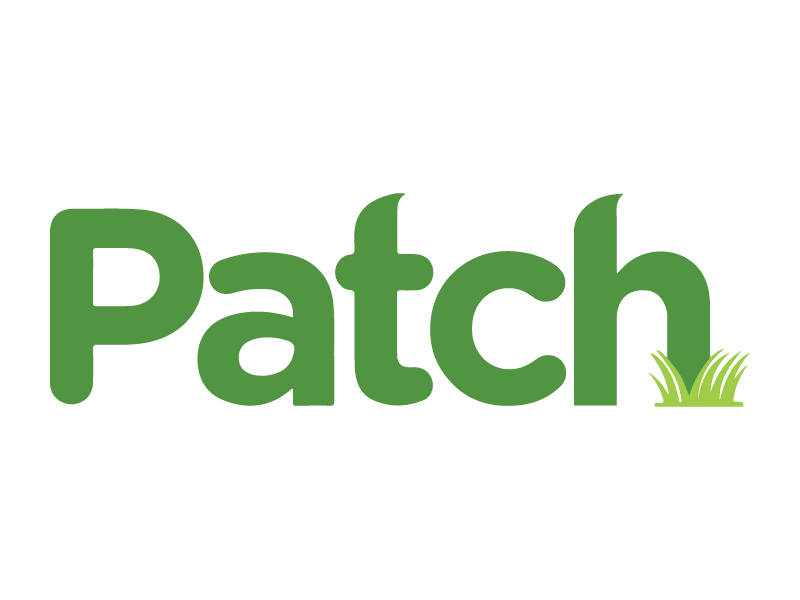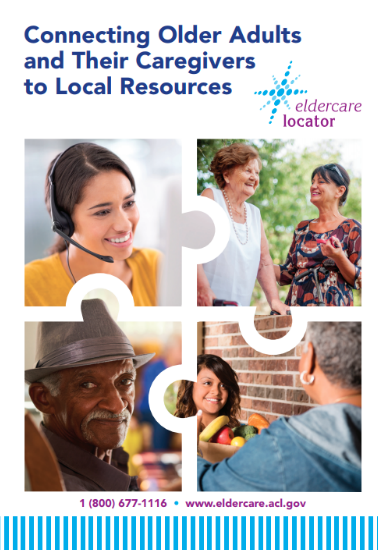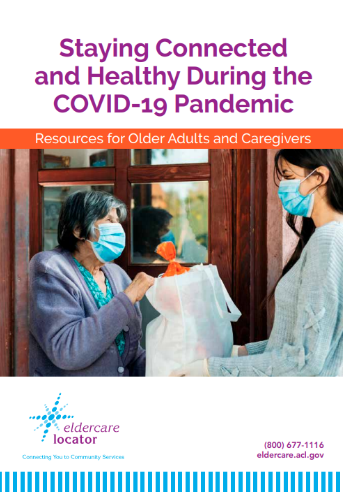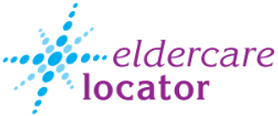Five Ways to Avoid Loneliness While Socially Isolating During COVID-19
2020 was a difficult year for all of us as COVID-19 crept upon us and took us all by storm. The pandemic has hit the Hispanic community particularly hard, especially older Hispanic adults, their families, and caregivers.1 While social distancing has been a way to protect our loved ones – especially the aging population – it has also been a big adjustment and has led to many people experiencing loneliness.
What is Social Isolation and Why is it Important to Stay Connected?
The Center for Disease Control and Prevention (CDC) defines social isolation as a lack of social connections which can lead to loneliness. It is also possible to feel lonely without being socially isolated. Studies show that social isolation can contribute to an increase in heart disease by 29%, stroke by 32%, and dementia by 50% in older adults.2 Contrasting this, social connection can slow cognitive decline and provide greater protection from some diseases.2
How has social isolation affected you and your family?
While we have all experienced different levels of social isolation, there are ways we can still stay in touch with the people we care about and support older adults. Here are 5 ways we can stay in touch with loved ones:
One of the best ways to lessen the feelings of loneliness and isolation is by making phone calls to others. Calling loved ones by phone is simple for most people, especially for those that are not familiar with the newer and more complex technologies necessary for video calling. Sometimes it can be hard to reach out to loved ones when feeling lonely. Scheduling calls can be a solution, and it allows family and friends to check regularly while maintaining their routines. Having calls allows us to simply catch-up about what is happening in each other’s lives, see if there is anything a family member may need, or share our needs.3 Knowing that your loved ones are a phone call away can give peace of mind for everyone and gives us something to look forward to. Talking with others promotes emotional health by knowing that you are thinking of them and they are thinking of you. A simple phone call to greet someone can make a big difference and even be the highlight of the day!
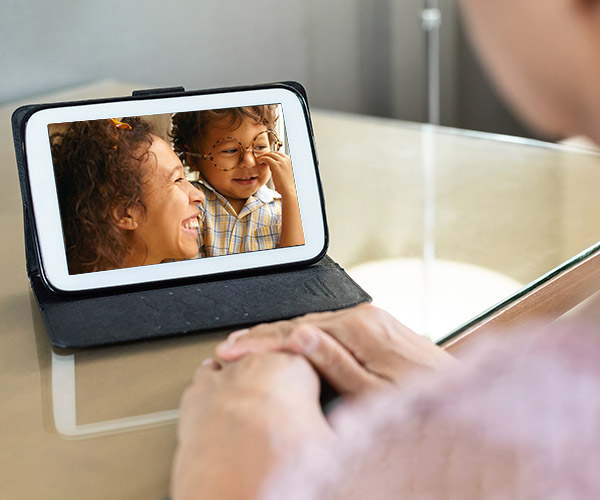
Video calling is also one of the top ways to stay in touch with one another. This may require additional equipment or features on a device. Sometimes it takes more than a phone call to see how someone is doing and seeing our loved ones face-to-face can make a difference! Also, sometimes it can be hard to hear what is being said for people experiencing hearing loss. With video calling, we can observe visual body cues, expressions, and hand gestures to make sure everyone on the call understands the conversation.4 A study conducted with adults aged 60 and older found that people who used video platforms to stay in touch with their families had a significantly lower risk of depression over time.5
Older adults are more tech-savvy than people may think! There has been an increase in older adults creating accounts on social media platforms to stay connected and/or reconnect with family and friends. Social media is a great tool to stay in touch through seeing pictures, receiving notifications, and being able to follow what our loved ones are up to every day. Seeing what our family and friends are up to can help alleviate feelings of isolation and loneliness. We can also share our experiences on social media so others can see what we are up to. Another benefit of social media is that we can socialize with friends and family via direct messaging services depending on the platforms used. This allows for constant virtual communication throughout the day and feelings of connectedness with our loved ones and the world. Many of these social media platforms also offer different groups to join depending on the person’s interest which provides another avenue for interaction with others.
Writing letters is another wonderful way to keep in touch with family and friends that is not used as often as it should be. Those in their golden years may not be able to use other methods of communicating but are familiar with writing letters. Writing can be beneficial for mental health, memory enhancement, and communication skills. Many older adults may feel more comfortable expressing their feelings and interacting by writing rather than by calling.7 The act of writing promotes the recollection of thoughts and allows individuals to get their point across before sending a letter. Finally, incoming letters and pictures can be saved by the recipient, which is a great way to feel connected and allows people to look back on them as memories.
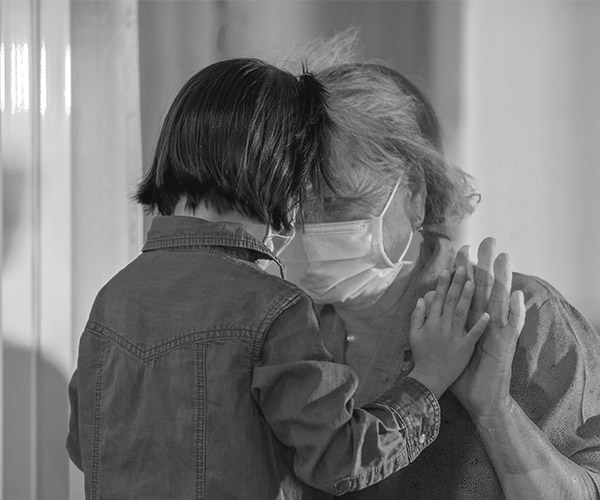
This pandemic has made it nearly impossible to visit loved ones, but we have seen people get creative about staying in touch with their loved ones, all while keeping a safe distance. One way that this has been done is by people checking in on loved ones through their windows. This method has mainly been adopted in assisted living and nursing homes. The organization coordinates a time to bring the older adult resident to a window, giving them the opportunity to look out and see their family members and sometimes even talk to them for a moment. This has also been done with older adults living in their homes in the community. Programmed routine check-ins for older family members that live at home in the community is encouraged and can be done in different ways. One way is by delivering groceries, goods, and/or gifts to their door as a form of checking-in. Even though you may not be visually interacting with your loved ones this way, it is a kind gesture and shows that they care and are being thought of.
Despite the many challenges that have surged this year due to COVID-19 and trying to keep everyone safe, we continue to find ways to connect with our families and friends while respecting socially distancing regulations. Socialization is important for our health and staying in touch with others through phone and video calls, social media, standard mail, and safely checking in with older adults by window can all be ways we continue to stay healthy in 2021.
In the News…
A breakthrough in the senior home and nursing home setting. Connect Care Hero is an activities management system that allows families to stay connected to their loved ones, see their participation, and see a view of their social wellbeing. To learn more about this innovative app, click here.
“Hello Casa” is an in-house show created and produced by residents of the senior living community Casa de Las Campanas in San Diego, CA. This show has been a new way to inform and entertain residents. The show ranges from interviews with staff and residents, tips, shout-outs, travel, happenings around the community, entertainment and much more. Click here to learn more!
Resources to Combat Loneliness
Eldercare locator has developed a brochure to help older adults and their caregivers connect to local resources. To view this resource, click here.
Eldercare locator has developed a brochure to help older adults and their caregivers connect to local resources. To view this resource, click here.
Also referred to as AAAs, an Area Agency on Aging is a public or non-profit agency designated by the government to address the needs and concerns of all older adults in their local geographic area. AAAs coordinate and offer services that help older adults remain in their homes, if they prefer, and to choose the services and living arrangements that best suit them. To find your local AAA, visit this website and input your location.
The Institute on Aging has a 24-hour Friendship Line for people 60 years and older and for adults with disabilities. The Friendship line is toll-free and makes on-going calls to lonely older adults. Call: 800-971-0016 For more information about this resource, click here.
AARP’s Friendly Voice Call line is a number that older adults can call if they’re feeling lonely. Friendly Voice volunteers will call the person back to say hello. An individual simply calls directly and leaves their information, and someone will call them back. Call: 1-888-281-0145 between 9am and 5pm local time. For more information, visit here.

MHP Salud has over 35 years of experience implementing CHW programs and training organizations looking to start and/or strengthen their own CHW programs. In addition, we provide technical assistance to build the capacity of service providers and community-based organizations that are looking to or in the process of addressing health concerns in their communities with CHW-led programs. Learn more about how we can help you below.
This project was supported, in part by grant number 90HDRC0004-01-00, from the U.S. Administration for Community Living, Department of Health and Human Services, Washington, D.C. 20201. Grantees undertaking projects under government sponsorship are encouraged to express freely their findings and conclusions. Points of view or opinions do not, therefore, necessarily represent official Administration for Community Living policy.
- https://academic.oup.com/psychsocgerontology/advance-article/doi/10.1093/geronb/gbaa158/5902962
- https://www.cdc.gov/aging/publications/features/lonely-older-adults.html#:~:text=Social%20isolation%20is%20a%20lack,lonely%20without%20being%20socially%20isolated
- https://www.risehealth.org/insights-articles/a-simple-phone-call-goes-a-long-way-when-it-comes-to-loneliness-amid-coronavirus/
- https://bethanylutheranvillage.org/top-benefits-of-video-chatting-for-seniors/
- https://psychcentral.com/news/2018/11/26/video-chat-can-help-combat-depression-in-seniors/140546.html
- https://www.ag.ndsu.edu/aging/posts/social-media-and-older-adults
- https://www.homecareassistanceanchorage.com/benefits-of-writing-for-elderly/


